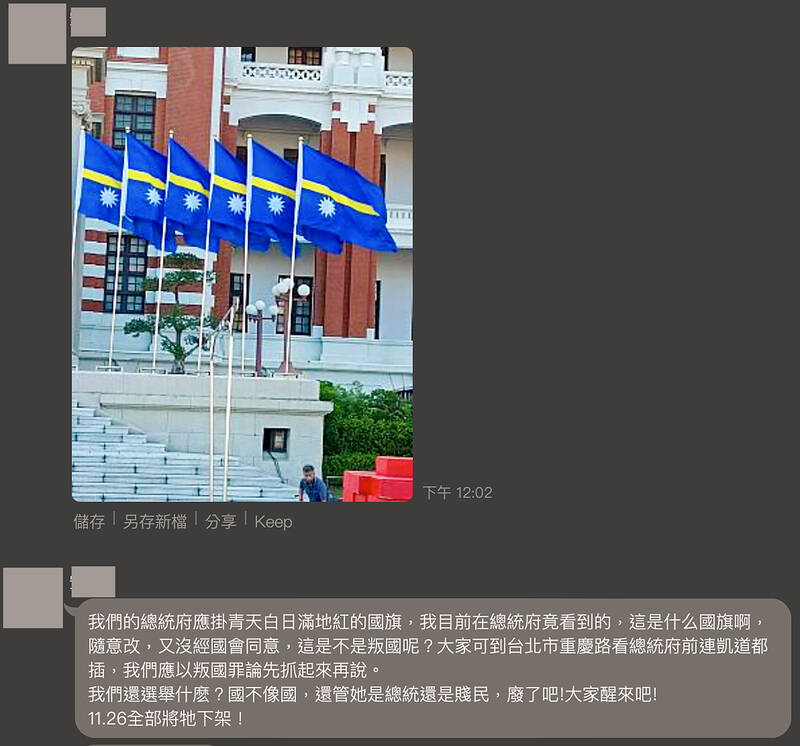Does voting while wearing disposable gloves invalidate a ballot?
As the pandemic continues to rage and people wear gloves to protect themselves against COVID-19, false news is spreading that wearing them could invalidate a voter’s ballot for next week’s nine-in-one elections.
This is just one bit of disinformation and misinformation circulating on social media and messaging apps over the past week about election integrity that is keeping the Central Election Commission (CEC) and Taiwan’s fact checkers working overtime.

Photo courtesy of the Taiwan FactCheck Center
The CEC says whether a person wears gloves to vote is their personal preference, and therefore legal.
As has become routine, the Internet, social media and communication apps are rife with lies that voting machines can be hacked or votes can be changed to favor the ruling party.
“The judiciary is controlled by the [ruling] Democratic Progressive Party (DPP), and prosecutors won’t investigate fraudulent [voting machine] software, so opposition parties and candidates need to be vigilant and prevent its use,” writes one.

Photo courtesy of the Taiwan FactCheck Center
The CEC in response has issued several statements insisting that the machines and the software used to tally votes are all secure, and that the vote counting system is built on a closed network, and not hooked up to the Internet.
It added that each voting precinct has observers from the public, religious groups, major political parties or candidates, as well as officials from the CEC that monitor the vote.
The CEC will also provide updated information constantly to domestic and foreign media, and simultaneously broadcast live on CEC’s official Web site. In other words, if there is any shenanigans, there’ll be plenty of people on hand to spot it.
Meanwhile, a message circulating on Line is calling on those who plan to vote for Chinese Nationalist Party (KMT) candidates to do so between 2pm and 3pm to avoid ballot tampering by election officials.
The message further claims that ballot boxes will be sealed at exactly 4pm, regardless if voters have already shown up before then and are waiting in line to vote.
National Chengchi University professor Tsai Chia-hung (蔡佳泓), who is also a researcher at the university’s Election Study Center, Academia Sinica law researcher Su Yen-tu (蘇彥圖), the Taipei City Election Commission and the Central Election Commission all tell the Taiwan FactCheck Center that the claims are misinformation. As long as voters arrive at the polling place before 4pm, they will be able to cast their vote.
The Taipei Election Commission says that election officials will stand at the end of the line with a sign reads: “voting line ends” (投票排隊終點).
In related news, a Facebook user posted a message claiming that he didn’t see the Republic of China (ROC) flag flying at the Presidential Office or along Ketagalan Boulevard this past week, only that of Nauru, whose president finishes a five-day state visit today.
“What kind of flag is this?” the Facebook user wrote, apparently referring to the Nauru flag. “Surreptitiously changing [the ROC flag] without the legislature’s consent, isn’t that treason?”
The poster added: “We should arrest them [the DPP] for treason and take it down on Nov. 26. The flag in front of the presidential palace is a fraud, the flag of a bandit gang?”
The Taiwan FactCheck Center sent reporters to the Presidential Office and Ketagalan Boulevard to determine the truth of the posts and found that, as is custom, the Nauru flag and ROC flag were interspersed along the latter and hanging from the former.
Former foreign affairs minister Chen Chien-jen (程建人) says that when a foreign head of state visits Taiwan, it is customary to fly the flag of that country at the presidential palace and Ketagalan Boulevard. Doing so serves to show respect for country and to publicize the visit to a domestic audience.